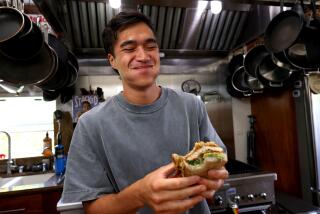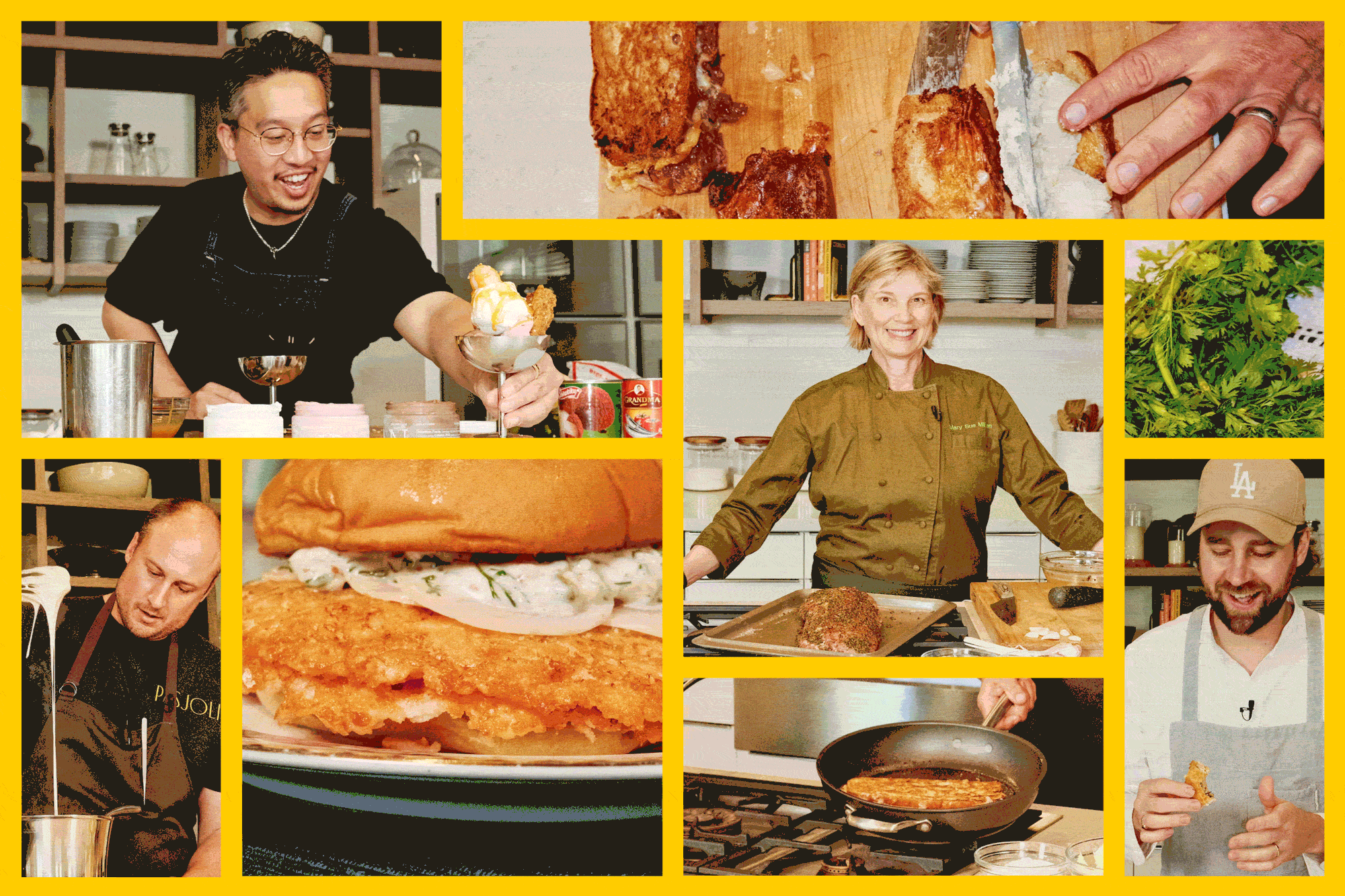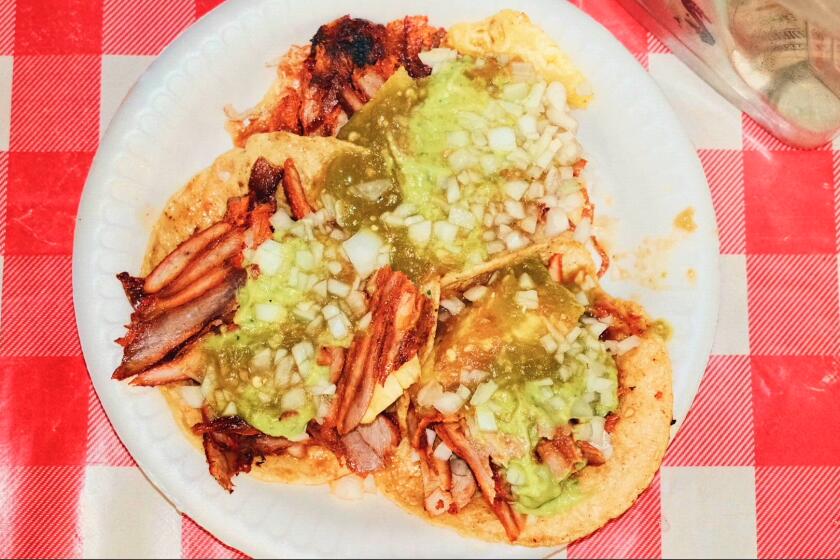The Artisan: Michel Blanchet, go-to guy for smoked fish
By noon on a recent weekday, the next day’s hickory-smoked Idaho trout orders are already cooling on metal racks, and the hundred or so salmon fillets cleaned that morning at Michel Cordon Bleu are a good halfway through their requisite five-hour smoke. Michel Blanchet, the 60-year-old owner of the small smoked seafood company, turns his attention to two employees who are hand-packing fillets into ice pack-filled Styrofoam boxes.
After a lifetime working with some of the greatest chefs in the business, Blanchet is now supplying some of them with handcrafted smoked salmon, having carved out a signature business that counts clients nationwide because of his insistence on a personal, artistic touch instead of an assembly-line approach.
“Listo [ready]?” the stocky Frenchman asks in Spanish, nodding toward several boxes of smoked fish. They’re destined for Washington, D.C.’s National Gallery of Art, where former L.A.-based chef Michel Richard, most recently of the short-lived Citrus at Social in Hollywood, has opened a temporary café in conjunction with an Impressionist painting exhibition. Another employee is packing a small box of salmon for Joël Robuchon’s namesake high-end French restaurant in Las Vegas.
“FedEx doesn’t wait. You must be always ready every day,” says Blanchet, a native of the Loire Valley, with a peppery accent. He pauses to answer his cellphone in English, switches to French to discuss the incoming order and flips back to Spanish as soon as he hangs up.
That these chefs are ordering high-dollar, artisan smoked salmon — not exactly the pillar of classic French cuisine — hardly strikes Blanchet as unusual. “It is hard to find good smoked fish,” he says matter-of-factly. “We have Italian restaurants, French and American customers. Smoked fish is more Scottish, I think?”
Blanchet is more interested in the production side of things at his nondescript factory, itself a melting pot of cultures, than the historic origins of smoked salmon. His wife, who is from Costa Rica, goes by Margaret to some, Margarita to others. The factory operations manager, El Yaakoube, grew up in Belgium (he and Blanchet primarily converse in French) but came to the job by way of a local Italian chef’s recommendation. And the four long-standing factory employees are Latino, so it’s not unusual to hear three languages — French, English and Spanish — being spoken at the same time.
Yet despite the varied languages, there is an unspoken connection between them.
“I must cook lunch,” Blanchet announces with a sudden urgency, disappearing into his office adjacent to the production kitchen. He digs among the boxes of imported dried French flageolet beans, moghrabieh (Lebanese couscous) and furikake (a Japanese dried fish and seaweed condiment) crammed on office supply shelves and settles on a few boxes of farfalle. “I love Italian food,” he says, smiling for the first time all day.
That love of cooking is how Blanchet wound up, rather circuitously, in the smoked-fish business. After apprenticing in restaurants as a teenager in Paulnay, a small town in central France, he worked in several countryside bistros before graduating to Parisian restaurants. In 1973, he moved to New York to work as the poissonnier (the chef responsible for seafood dishes) of the now-closed La Caravelle, a French restaurant in Midtown Manhattan. Moving to Los Angeles two years later was not exactly part of his plan.
“A friend in L.A. told me that a new restaurant, L’Ermitage, was opening and needed chefs, so I went,” recalls Blanchet.
It was at the famed French restaurant that the young sous-chef first began smoking salmon. “The quality here [in L.A.] was not so good, so I just made my own,” he says, rather humbly for a chef who was second in command to Jean Bertranou, considered by many to be the father of fine French cooking in Los Angeles. When Bertranou died in 1980, Blanchet was chosen to lead the kitchen.
After L’Ermitage closed in 1991, Blanchet hopped between high-end hotel restaurant jobs, including a three-year stint at the now-closed L’Escoffier at the Beverly Hilton. He opened Michel Cordon Bleu in 1995.
“I had to do something for me,” he
Next door in the industrial kitchen, an employee is feeding salmon fillets, each nearly 2 feet long, through a machine that neatly slices off the tough skin. Another employee removes the long strip of dark meat running down the center of each fillet, carefully slicing away just enough surface meat so the entire fillet is a vibrant coral color. On a busy week, several thousand pounds of this Canadian Atlantic salmon will find its way into Blanchet’s smoker.
“It is always the freshest and best,” he explains of his preference for Canadian fish. He uses mainly farmed salmon (though he gets wild for special orders) and buys only enough to fill that week’s orders, just as he did at L’Ermitage years ago when he was smoking fish by hand. At the request of customers, Blanchet has added tuna, Coho salmon and scallops to the more classic smoked salmon and trout on his menu.
But not everything is quite the same as it was at the restaurant. “No human can cut fish this thin,” he says, proudly patting his Danish slicing machine and holding up a paper-thin slice of salmon.
At more than $100,000, the slicer is among Blanchet’s most substantial investments in recent years. Four years ago, he also purchased a computerized smoker that competes for his bragging rights. “Even on the hottest day, the computer can keep it at just the right temperature, humidity,” he says, still seemingly amazed by the technology (cold smokers slowly cook meat at low temperatures, typically around 90 degrees Fahrenheit to retain moisture and create a tender texture).
But for a handful of customers, Blanchet will still hand-tweak his standard salt-and-sugar cure to their exacting specifications. “He is very difficult,” Blanchet says, nodding toward Robuchon’s small box of smoked salmon. Chefs with special requirements tend to order in such small quantities that Blanchet does not make money off their smoked-Chinook whims. “But I am a chef too, so when they come knocking, it is an honor.”
After the FedEx agent has picked up the day’s orders, Blanchet focuses on the most pressing task at hand: making lunch. He hunches over the stove with the same attention he gives his fish, stirring and tasting the creamy tomato sauce as he goes.
“It is how I keep [my employees] working here, by cooking for them,” he says, half joking. Other than pasta, a typical workday meal might include lamb and new potatoes, herb-roasted chicken or a generous cut of beef slow-braised in Blanchet’s family-sized copper cassoulet pan.
When the farfalle is perfectly al dente, Blanchet adds the pasta to the sauce.
“Ven a comer [Come eat],” he calls, scooping generous portions of pasta onto plastic plates and topping each with a thick pan-fried prime New York steak that he’s quickly cooked up next door (food regulations preclude the cooking of meat in a seafood production facility). As his staff heads back outside to eat, Blanchet starts to clean up the stove, preparing for the next day’s orders.
“I try to run it as if we are a family business.”
Michel Cordon Bleu smoked fish is available at Surfas, Wally’s Wine and Spirits, Larchmont Village Wines and Spirits and the new McCall’s Meat and Fish Co. in Los Feliz.
More to Read
Eat your way across L.A.
Get our weekly Tasting Notes newsletter for reviews, news and more.
You may occasionally receive promotional content from the Los Angeles Times.






